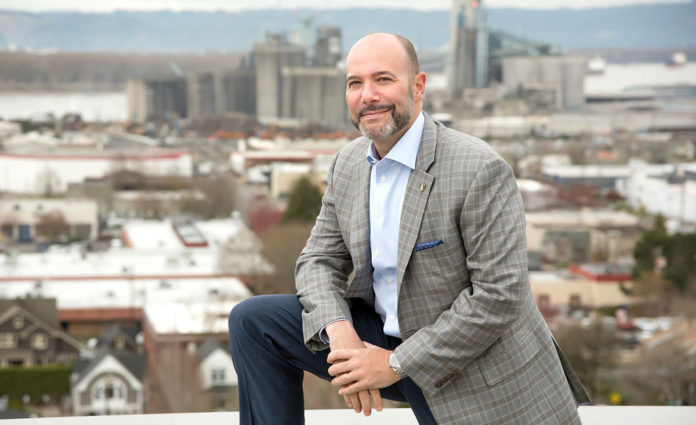
According to Augusto Bassanini, CEO of Vancouver-based United Grain Corporation, “being around for 50 years, you really toughen up your skin.”
“This is not the first government-to-government dispute we’ve endured,” Bassanini said, referring to ongoing trade disputes between countries in Asia and the U.S. “(There were some trade wars) in the 1980s, and we managed to overcome those, we’ve been around to manage all those; we can withstand this as well.”
This month, United Grain is celebrating their 50th anniversary of helping feed the world. Over those past 50 years, the company has transported American-grown whole grain commodities from farmlands in Eastern Oregon, Washington, Montana and Northern Plain States to their export facility along the Columbia River in Vancouver. Today, the facility is the largest grain export terminal on the entire West Coast capable of storing 220,000 metric tons. About 100 ocean-going vessels visit the facility each year and ship the grains to markets in Asia, Central and South America, and the Middle East.
“We’re proud to call Vancouver home for the last 50 years and look forward to continued success for our company and our community,” Bassanini said.
Although the original grain export facility – which is located at the Port of Vancouver USA – was actually constructed in 1934, Bassanini said United Grain first acquired the facility in 1969. When the company began operations in June of 1969, Clark County’s population was just 128,000 people. Today, the population is approaching 500,000.
According to a news release from United Grain, at that time the Columbia River represented a modest amount of U.S. grain exports. Today, the U.S. ships more than 93 million metric tons of grain products annually, nearly a third of which comes through the Columbia River.
“Congratulations to UGC on their golden anniversary,” said Port of Vancouver USA CEO Julianna Marler. “We appreciate their long-standing operation at the Port of Vancouver USA and the investments they’ve made to support our community. More than 50% of the nation’s wheat comes through the Columbia Snake River System. And United Grain’s premier facility here at the port makes them a critical shipping hub for farmers across the Northwest, Plains and Midwest, helping them efficiently get their grain from U.S. fields to consumers in Japan, China, Korea and South America.”
Over the past 50 years, Bassanini said some of the biggest changes they have seen at United Grain are not so much changes with the commodities themselves, but with the size and scope of those different commodities.
“Everything used to be handled in bags, transported on a much smaller scale,” Bassanini said. “Now everything is done on a much larger scale – we have large ships, large destinations, etc. We had to adapt our transportation capabilities; that has been one of the biggest dynamics.”
As an international grain trader, Bassanini said the company is facing significant impacts as a result of ongoing trade disputes between countries in Asia and the U.S. Grain exports have dropped dramatically as a direct result of trade tariffs imposed by the U.S. and retaliation from other countries. For soybeans alone, the region has seen a 50% drop in exports compared to the 2017-2018 harvest year.
“The trade war isn’t just hurting American farmers, it’s the entire supply chain – barge companies, rail operators, longshoremen, shipping companies, ports and more,” Bassanini said. “Without a quick resolution the long-term consequences will worsen.”
“We’re focused on building for the next 50 years so that we can continue to provide good family wage jobs right here in Southwest Washington,” Bassanini continued. “Ongoing trade disputes are presenting substantial challenges for our company and we’re working to mitigate them.”
Even with some of the challenges United Grain has been presented with, the company continues to see growth. Bassanini said last year’s volume was up 15%, reaching six million tons of exports. The company directly supports 110 family wage jobs, most of which are at the company’s export terminal or downtown Vancouver headquarters.
Bassanini said United Grain will continue to look for new growth opportunities while also continuing to provide quality. He said they are always looking into new markets and new products as dietary changes evolve in the U.S. and transpire over to Asia. He cited the meatless hamburger as an example of a dietary change that changes up some of the exported products.
“There are more plant-based protein foods that use peas, soybeans, garbanzo beans … consumers are looking at food as a health benefit, but they also want something that tastes good,” Bassanini said.
Looking ahead to the next 50 years, Bassanini said United Grain plans to continue to call Vancouver home.
“We’ve been a fabric of this community for 50 years, we plan to remain for 50 years and more,” he said. “We’ve grown with Vancouver and want to continue to prosper with our community for the next 50 years. We continue to work tirelessly to build for the future.”





